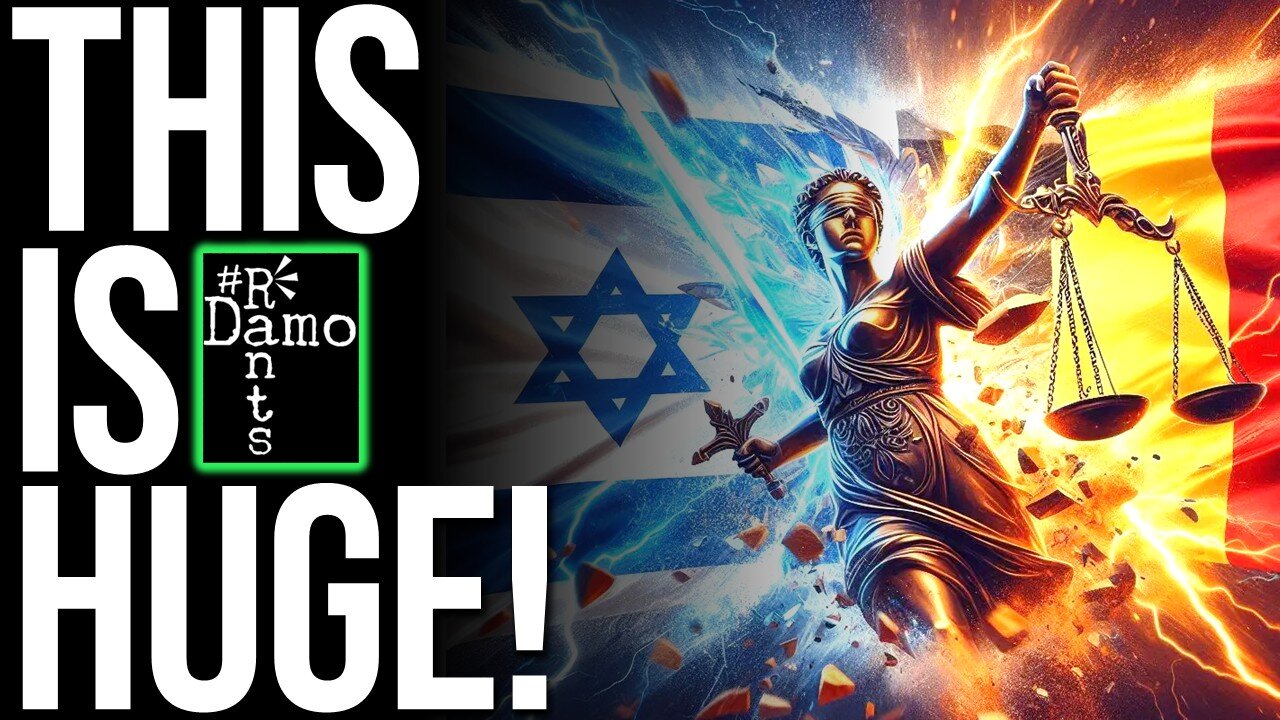Premium Only Content

Europe Just Made History Over Gaza – And Israel is Freaking Out
Right, so Israeli soldiers have long strutted through Europe with the confidence of tourists, not fugitives—posting smiling selfies in Paris, sipping cocktails in Ibiza, and assuming that, whatever they did in Gaza, Europe’s laws would never touch them. That illusion ended in the most unlikely of places: a Belgian music festival. At Tomorrowland, better known for pounding DJ sets than legal precedents, two Israeli soldiers found themselves not at the VIP bar but in the custody of Belgian federal police, being interrogated as suspected war criminals.
A rave turned courtroom you might say—but the symbolism could not be more serious. Belgium, invoking its newly strengthened universal jurisdiction law, did what no European country had dared to do before – they just made history: treat Israeli soldiers as if the rules of international law actually applied to them. It should not really be an historic event, the rules are meant to apply equally after all. This was also not a full trial, and the men were released soon after, but the damage was done and actually full prosecution needn’t even be the actual point of this exercise, because for the first time, Israeli military personnel were no longer untouchable in Europe. And that, for Israel, is far more dangerous than any guilty verdict that might have been.
Right, so for far too many decades of illegal occupation, Israeli soldiers travelled across Europe without any fear of arrest, confident that their government’s political alliances and Western diplomatic support would shield them from any accountability for what they might have been up to. That confidence got shaken to bits about a week ago now, when two Israeli men—one an active-duty soldier, the other a reservist—were detained by Belgian federal police at the Tomorrowland music festival in Boom, which is just the best name for a place ever to hold a music festival at. Acting on detailed complaints filed by the Hind Rajab Foundation (HRF) and the Global Legal Action Network (GLAN), Belgian authorities invoked universal jurisdiction to interrogate the men over alleged war crimes in Gaza. According to reports from The Financial Times, Al Jazeera and Press TV, the accusations included indiscriminate destruction of civilian infrastructure, and possible participation in operations that violated international humanitarian law.
The men were released after questioning though and quickly left Belgium for the Netherlands, yet the significance of their brief detention is still huge. This was the first time in European history that Israeli soldiers had been treated as war crimes suspects under universal jurisdiction. The fact that it happened in Belgium, a country with a long tradition of using its courts to prosecute international crimes, gives this case enormous symbolic weight. Even if the investigation does not now lead to formal charges, the psychological and political consequences are already reverberating. Israel was once able to rely on European passivity, is now forced to confront the reality that its soldiers may no longer travel abroad with impunity. The arrests have cracked open a door that activists and lawyers have been trying to force for decades.
To understand why this matters, it’s worth looking at how Belgium broke with decades of precedent and why groups like HRF and GLAN are pursuing this strategy, they’ve already had success outside of Europe doing this and what the broader consequences might be for Israel and for international justice.
Belgium’s decision to act was not an accident but the product of a unique legal environment and a growing willingness in parts of Europe to challenge Israel’s long-standing immunity. Belgium has a history of pioneering universal jurisdiction; its courts have previously prosecuted Rwandan and Congolese war criminals. Although earlier attempts to prosecute high-profile figures such as former US President George H.W. Bush for Iraq war crimes were blocked under political pressure, Belgium’s 2024 reform of its Code of Criminal Procedure restored broad powers to prosecute genocide, war crimes and crimes against humanity committed abroad, provided the suspect is physically present in the country. This was the mechanism used to arrest the two Israelis.
The significance lies not only in the law itself but in the fact that Belgium was willing to apply it to Israeli citizens. For decades, European governments avoided prosecuting Israeli personnel, fearing diplomatic backlash from Israel and the United States. Well, that taboo has now been broken: 21 months of graphic genocide playing out daily across our social media feeds around the world made sure of that. Israel’s once-unquestioned shield of Western political and mainstream media protection got subverted and was no longer absolute. Universal jurisdiction had previously been applied against individuals from African and Middle Eastern states, but rarely against citizens of Western-backed democracies, such was the double standard that has always been at play. This shift is not merely legal; it is political, signalling that at least some European jurisdictions are no longer willing to exempt Israel from the rules applied to others.
The details of the case also illustrate how international justice is changing. Much of the evidence presented to Belgian prosecutors came from the soldiers’ own social media posts. Photographs of them posing in bombed-out civilian neighbourhoods, combined with testimony from Palestinian survivors gathered by HRF, formed the basis of the complaints. Social media has become a self-incriminating evidence trail that activists can exploit, making it harder for Israeli soldiers to hide behind denials. In an era where open-source investigations and satellite imagery are used to build war crimes cases, the Belgian arrests show how digital evidence can translate into real-world legal consequences.
The precedent is also important because it targets rank-and-file soldiers, not just political leaders. The International Criminal Court’s investigation into Israeli war crimes has focused on senior officials such as Prime Minister Benjamin Netanyahu and the Former Defence Minister Yoav Gallant, but Belgium’s action sends a different message: ordinary soldiers are not immune either. This could have a deterrent effect on future military operations, as individual soldiers begin to consider the personal legal risks of carrying out questionable orders, which is something they are supposed to do, they can actually refuse orders which violate international law, the fact Israel has acted with so much political immunity as well as impunity for so long is why this is so rarely ever a consideration to my mind.
Both the Hind Rajab Foundation and GLAN are part of a growing movement using law as a form of activism—a strategy often referred to as “lawfare.” So often we’ve seen this weaponised against protesters here in the UK, its also being used by Iran against Israel too, as I covered in a story the other day, but it is being deployed against Israel by organisations like these as well. Their goal is not simply to secure immediate convictions, which are notoriously difficult in politically sensitive war crimes cases, but to build a cumulative legal and reputational campaign that erodes Israel’s international legitimacy.
The HRF, named after a six-year-old Palestinian girl killed in Gaza, was established specifically to document and prosecute war crimes. Working with GLAN, a UK-based legal network, the foundation has been systematically collecting evidence, including sworn witness statements, video footage, and open-source intelligence. According to the New Arab, the HRF claims to have already identified over a thousand Israeli soldiers for potential legal action in multiple jurisdictions. GLAN, which has experience in successful universal jurisdiction cases against other states, provides the legal expertise to craft complaints that domestic courts cannot easily dismiss.
First, they aim to undermine Israel’s diplomatic shield by forcing Western governments to choose between upholding international law or appearing complicit in war crimes. Belgium’s action demonstrates that at least some courts are willing to act independently of political pressure, setting an example for others. Second, they seek to weaponise reputation. The activists understand that even if a case fails, the headline “Israeli soldiers arrested for war crimes in Europe” is itself a victory, damaging Israel’s global image and strengthening the Palestinian narrative of victimhood and resistance. Third, they are building legal dossiers for the future. Even if current political conditions prevent prosecutions, these cases create a record that can be revived if political climates shift or if suspects travel to less friendly jurisdictions. Finally, there is a psychological dimension. By making soldiers fear arrest abroad, these groups hope to deter future abuses and sow doubt within the Israeli military.
The response from Israel shows that this strategy is working. IDF legal advisers have apparently begun warning soldiers and reservists to scrub their social media profiles and to avoid travel to countries with strong universal jurisdiction laws. Building amongst Israelis a sense of previously unheard of accountability is precisely what HRF and GLAN are aiming for. In their view, impunity erodes one precedent at a time.
The Belgian arrests have already created consequences that extend far beyond the two individuals involved. The most immediate impact is reputational. Israel has long promoted the idea of having the “most moral army in the world,” but the image of its soldiers being arrested in Europe for suspected war crimes directly contradicts that narrative, on top of all the other numerous examples that might spring to mind after 21 months of genocide. Even in Europe, the arrests have generated debate about whether Israel should continue to enjoy diplomatic protection in the face of growing evidence of human rights violations and challenging the views of governments for too long aiding and abetting Israel in whatever they do, but here and now that is becoming politically more and more untenable – real consequences must come for complicit governments too.
The psychological impact on the IDF is also significant. For the first time, rank-and-file soldiers are being forced to consider that their actions may have personal consequences long after leaving the battlefield. The knowledge that travel abroad could result in arrest or interrogation is now firmly on their minds given the orders they may have been given, Where it might still be considered a tad optimistic to imagine this may deter some from participating in aggressive operations, at least it sows doubt and perhaps will make them more cautious. Conversely, it may also create resentment towards commanders who issue these l orders, potentially undermining military cohesion.
Diplomatically, the case has placed Israel on the defensive though, they are not happy bunnies here. The government is pressuring Belgium to close the investigation, but because the judiciary is independent, political interference is limited. According to the Washington Centre for International Justice, Belgium’s move is likely to embolden other countries with similar laws, such as Spain, Germany, and even the Netherlands where these two soldiers scuttled off to. If even a handful of European states begin following Belgium’s lead, Israeli soldiers and officials could find themselves effectively trapped within Israel, unable to travel without risk of arrest.
Perhaps most damaging of all is the precedent itself. Just as Chilean dictator Augusto Pinochet’s 1998 arrest in London, despite ultimately being released, signalled the end of an era of unquestioned immunity for former heads of state, the Belgian arrests may be remembered as the moment Israeli soldiers ceased to be untouchable abroad. Symbolism matters in international law because it shapes expectations and normalises previously unthinkable actions.
Belgium’s actions are already inspiring activists elsewhere. Spanish lawyers are preparing new complaints, citing Belgium as precedent. German NGOs are gathering evidence for similar cases, pointing to Germany’s own history of prosecuting Syrian war criminals under universal jurisdiction. In the Netherlands, where the two soldiers headed off to, activists are lobbying prosecutors to open an investigation. South Africa, which has already taken Israel to the International Court of Justice over accusations of genocide, is exploring domestic prosecutions under its own universal jurisdiction framework.
The HRF and GLAN are coordinating with lawyers and NGOs across these jurisdictions and more, creating what amounts to a global legal siege. Their goal is to make international travel so risky for Israeli soldiers and officials that they become virtual prisoners within their own country. To effectively make them feel like what it must be like to have lived in Gaza for the last 20 years. Even if few cases result in convictions, the fear of arrest alone will be a victory. This strategy mirrors the slow but ultimately effective campaign against apartheid-era South African officials, who gradually became isolated and unwelcome abroad.
Israel is now fighting a war it cannot easily win given what it is very much still doing. Its government is expanding legal defence teams to counter universal jurisdiction cases and lobbying European governments to restrict activist influence, but this is once more spending money Israel is rapidly running out of. It is also attempting to reframe the issue as politically motivated “lawfare,” hoping to rally its Western allies, which would be the height of hypocrisy amongst many leaders. But these countermeasures carry risks. The more Israel protests, the more media attention the cases receive, keeping the narrative alive. Moreover, unlike diplomatic negotiations, independent courts are not easily swayed by political pressure. Belgium’s judiciary acted because the law compelled it to, not because of public opinion, and other European courts may follow the same reasoning.
The long-term risks for Israel are serious. If more cases are filed, its soldiers, reservists, and even senior officials may avoid travel to Europe altogether, limiting Israel’s diplomatic, military, and economic engagement. Tech executives and defence contractors could also become targets, complicating trade relationships. The narrative of Israel as a modern, Western democracy will be harder to sustain if its personnel are treated internationally like pariahs.
The arrest of two Israeli soldiers in Belgium will not end Israel’s occupation of Palestine or bring immediate justice to Gaza. But it marks a turning point in the long struggle against impunity. For the first time, European authorities treated Israeli soldiers as suspected war criminals, breaking a taboo that has protected Israel for decades. The consequences—reputational damage, travel risks, diplomatic fallout, and psychological pressure—are already evident. Activists like those at HRF and GLAN understand that international justice moves slowly, but they also know that every precedent matters. Impunity does not collapse overnight; it erodes, one case at a time.
For Israeli soldiers booking their next European holiday, the message is clear: the days of guaranteed immunity are over. What began as a quiet arrest at a music festival may, in time, be remembered as the moment Israel’s era of untouchable impunity finally came to end.
For more on Iran’s use of lawfare against Israel, so often having been used against them by the West is a delicious case of irony too. Get all the details of that story in this video recommendation here as your suggested next watch.
Please do also hit like, share and subscribe if you haven’t done so already so as to ensure you don’t miss out on all new daily content as well as spreading the word and helping to support the channel at the same time which is very much appreciated, holding power to account for ordinary working class people and I will hopefully catch you on the next vid. Cheers folks.
-
 3:03:00
3:03:00
Side Scrollers Podcast
18 hours agoXbox is IN SHAMBLES + Player BANNED for MAGA Hat + H3H3 Lawsuit COOKS Reddit + More | Side Scrollers
29.9K8 -
 1:09:08
1:09:08
MattMorseTV
17 hours ago $12.63 earned🔴Trump's MASSIVE Monday UPDATE.🔴
10.8K95 -
 19:54
19:54
Forrest Galante
1 day agoPrivate Tour Of America's Best Marine Animal Facility
55K7 -
 13:25
13:25
Nikko Ortiz
2 days agoWorst Karen TikTok Fails
41.8K16 -
 5:42
5:42
GritsGG
13 hours ago6 EASY Warzone Easter Eggs!
4.91K1 -
 LIVE
LIVE
Lofi Girl
2 years agoSynthwave Radio 🌌 - beats to chill/game to
212 watching -
 40:24
40:24
The Connect: With Johnny Mitchell
3 days ago $24.24 earnedInside The WORST Drug-Infested Slums Of Medellin, Colombia
82.2K35 -
 38:27
38:27
TruthStream with Joe and Scott
1 day agoA roundtable with Lisa, Carole and Michelle. Our travels through Spain and Ireland #497
8.52K1 -
 2:58:00
2:58:00
FreshandFit
8 hours agoAyesha Curry Says She Never Wanted A Family All Along
145K81 -
 15:46
15:46
Odd Man Out
2 days agoThese 40 something women discover they're worthless, but only when it's too late
14.6K122
